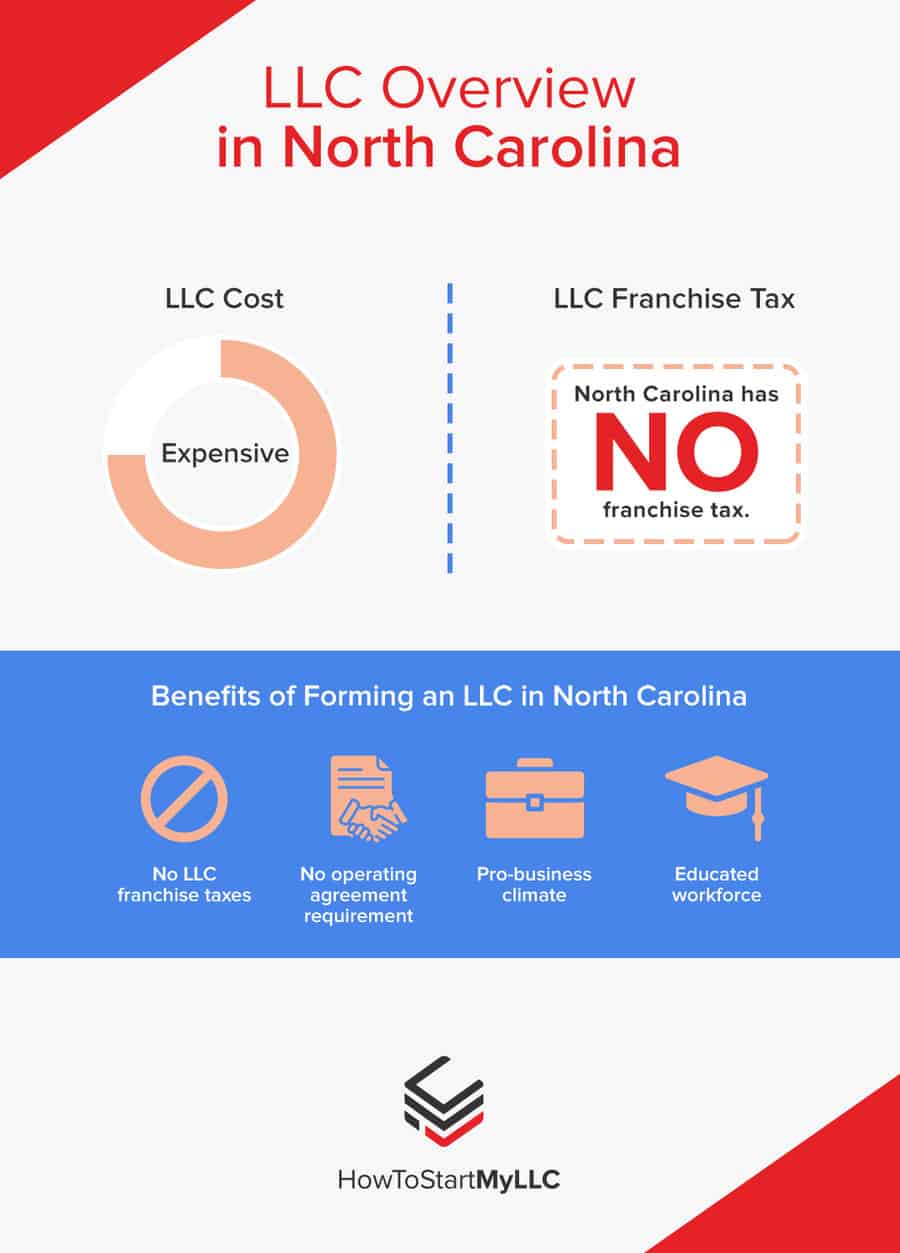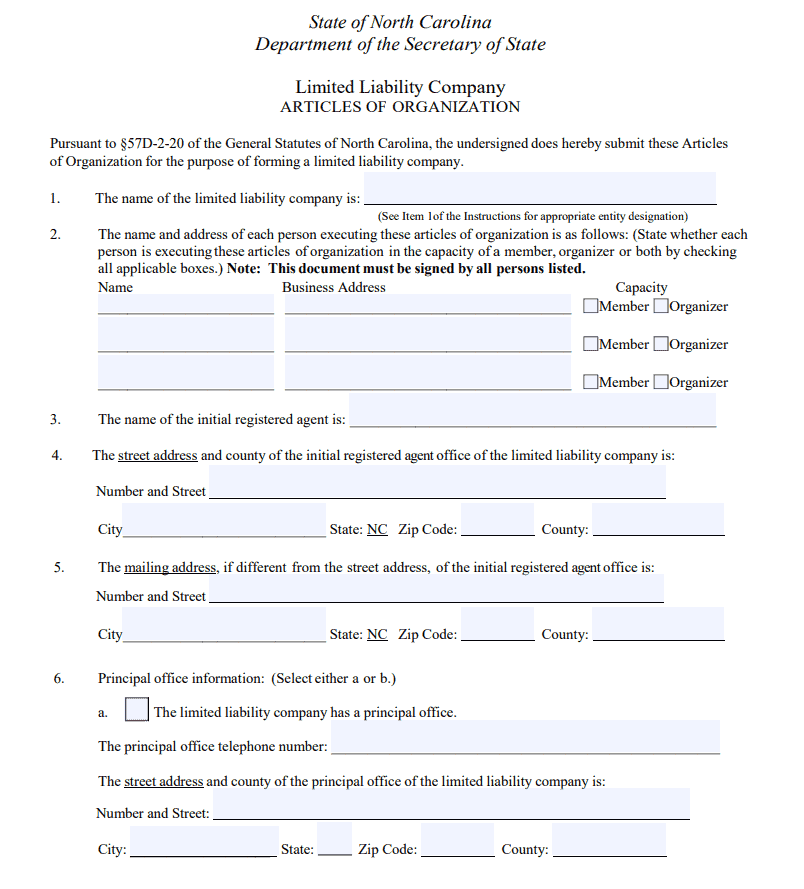
Carolyn Young has over 25 years of experience in business in various roles, including bank management, marketing management, and business education.
For over 15 years, Sarah Ruddle has been a noteworthy leader in the business and nonprofit world.
Updated on July 18, 2024

When starting a new business, one of the first big decisions is which type of business entity to form. Many entrepreneurs choose a limited liability company (LLC) because of its many benefits. An LLC provides personal liability protection, for example, so that your assets are not at risk if your business is sued or cannot pay its debts.
Also, an LLC is a “pass-through entity” in taxes, meaning income passes through the company to the LLC owners or members who report it on their tax returns.
LLCs also offer flexibility in management and tax status, yet another reason it’s popular in North Carolina.
Here are the steps that you need to take to form an LLC in North Carolina.
If you prefer video content, we offer an extensive visual guide on forming an LLC in North Carolina.

Naming your business can be challenging. You need a name that’s unique and easy to remember and conveys what your business does. To choose a name, you can try a few different methods:
Your business name is your business identity and the first impression people will have of your company, so be sure to take your time with this step and get it right.
Once you have a few business name ideas, you’ll want to ensure they’re available. First, do a business name search on the North Carolina Secretary of State’s website. Here’s how to conduct a North Carolina LLC name search and check the availability of your desired entity name.
Also, check your North Carolina’s LLC naming regulations to ensure you comply.
![]()
In North Carolina, your LLC name must include “limited liability company” or an abbreviation (LLC or L.L.C.) and cannot have words that could confuse your LLC with a government agency.
Additionally, your business name must be distinguishable from all other business names in the state. There are statutory and administrative code prohibitions to using specific words in a name.
Next, check with the US Patent and Trademark Office to ensure the name is not trademarked and is thus available nationally.
Here are additional tips and suggestions provided to assist in the process of choosing a name for a North Carolina LLC.
Once you’ve confirmed these, it’s a good idea to reserve the name with the state using its Name Reservation form.
North Carolina requires LLCs to appoint a registered agent, a person or company authorized to accept and respond to official business correspondence, such as legal, tax, or financial documents.
The registered agent ensures all required notices and documents are received. In North Carolina, the registered agent can be an LLC member, individual, or entity that meets state requirements. In North Carolina, a registered agent must:
Many business owners hire a registered agent service to ensure their LLC stays fully compliant and for convenience.
If you choose to be your registered agent, you must be at your registered agent’s address for all business hours. A registered agent service allows you to be wherever you need to be to run and grow your business.
Members or managers can manage LLCs. In a member-managed LLC, members handle all management duties. In a manager-managed LLC, non-member employees oversee operations and management duties.
Note that with a manager-managed LLC, a member can be a manager, but only in cooperation with another manager who is not a member.
Member-managed LLCs generally work best for LLCs with few members, all of whom are able to take an active role in day-to-day operations. Conversely, manager-managed LLCs are best for LLCs with multiple members, some of whom want to be “silent” or passive members and not involved in day-to-day operations.
Most LLCs are member-managed, as they are small businesses that cannot afford a management team. In North Carolina, your LLC is considered member-managed if it’s not otherwise specified in the articles of organization.
Discover the difference between member-managed and manager-managed LLCs, and gain insights on selecting the appropriate management structure for your LLC.
To form your LLC, you’ll file Articles of Organization on the website of the Secretary of State. Here’s a link to the Articles of Organization form. This document requires the following information:

![]()
The filing fee is $125. You should receive confirmation in three to ten days if you file online. The turnaround time for filing by mail can be up to three weeks.
Phone: 919-814-5400
Physical Address:
2 South Salisbury Street
Raleigh, NC 27601
Mailing Address:
PO Box 29622
Raleigh, NC 27626-0622
An Operating Agreement is a legal document that outlines the ownership and member duties of your Limited Liability Company (LLC).
North Carolina does not require an operating agreement, but it’s still a good idea to have one, even for single-member LLCs, as it can provide legal protections and more established operating procedures.
Here are the elements an LLC Operating Agreement should typically include:
You can find operating agreement templates online, but it’s best to have them drawn up or reviewed by an attorney. The language of an operating agreement is crucial and can often help determine how member disputes will be resolved. For more information about the operating agreement, refer to our comprehensive guide on the North Carolina LLC operating agreement, and you can also obtain a free template.
The IRS uses an EIN to identify your company for tax filing purposes. An EIN is required if your LLC has more than one member or if you are hiring employees.
Obtaining an EIN simply requires applying on the IRS website, as detailed here:
All EIN applications (mail, fax, electronic) must disclose the name and Taxpayer Identification Number (SSN, ITIN, or EIN) of the true principal officer, general partner, grantor, owner or trustor. This individual or entity, which the IRS will call the ‘responsible party,’ controls, manages, or directs the applicant entity and the disposition of its funds and assets. Unless the applicant is a government entity, the responsible party must be an individual (i.e., a natural person), not an entity.
Depending on the nature of your business, you may need to apply for various licenses and permits at the federal, state, and local levels.
At the federal level, licenses and permits are generally industry-specific and may include health licenses and permits from the Occupational Safety and Health Administration (OSHA). Check the SBA guide for specific licenses required for your business.
North Carolina has no general business license that will ensure compliance with all requirements.
If you sell tangible goods or services subject to sales tax, you’ll need a sales tax license, also known as a seller’s permit.
Here are some standard licenses and permits you may need:
This is a very important step in the LLC formation process, so make sure that you check with your state and local government offices to find out all the licenses and permits you need.
You could face steep fines and penalties if you operate without the proper licenses and permits.
It’s a good idea to consult with a business attorney to make sure you’re in full compliance. You can also use a service like MyCorporation to do the research and provide you with all the forms you need to license your business entirely.
By default, an LLC is a “pass-through” entity, which means the business itself does not pay income taxes. Instead, the business’s profits or losses are passed through to the members’ individual tax returns. The taxes are then paid at each member’s individual tax rate.
An LLC can also choose to be taxed as a corporation by filing an election form with the IRS (Form 8832 for a C-Corp and Form 2553 for an S-Corp). This can be beneficial under certain circumstances:
When you have an LLC, it’s important to keep your business and personal finances separate for accounting and tax purposes. Commingling your business and personal funds can threaten your liability protection since the line between business and personal assets will not be clear.
Most banks offer business bank accounts, so check with your local bank. You’ll need your EIN and a copy of your articles of organization. Your bank may require other documents as well.
A business credit card can help establish business credit so that if you apply for a business loan or line of credit in the future, you’ll have a better chance of getting approved. A business credit card can also help pay startup expenses, reducing out-of-pocket costs.
Insurance is the right choice to protect the investment you’ve made in your business. There are several different types of insurance you may need.

You’ll want to keep copies of your formation documents and operating agreement in a safe place. Any other official documents, such as vendor contracts and legal or financial documents, should also be kept in your records.
LLCs in North Carolina must file an annual report to remain in good standing. The fee is $200, and the report is due April 15 th each year.
| Requirement | Cost |
|---|---|
| Name Reservation Fee | $30 |
| LLC Registration Fee | $125 |
| Business License Fees | Vary by localities and type of business |
| Assumed Business Name Fee | $26 |
| Annual Report Fee | $200 |